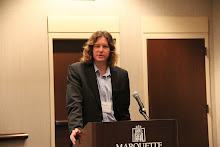Check out the exceptionally enjoyable and interesting essay by the Leibniz scholar Justin E. H. Smith over at the great site 3 Quarks Daily.
Aside from offering a fascinating explanation for why the phrase "cheap whore" is an oxymoron and how the word "whore" is related to the word "charity", Professor Smith also calls for the creation of a paleontological branch of concept analysis which takes the study of etymology as a compliment to the study of concepts proper. This, of course, is based on the assumption that concepts are something more, less, or other than the words which express them.
In the course of calling for an etymological paleontology Professor Smith touches upon both Heidegger and Foucault. In supposed disagreement with Heidegger, whom he claims thought that the etymology of words directly provides access to what people who used those words were actually thinking, Smith calls for a practice that "takes the analysis of etymologies seriously not because they tell you what word-users are thinking, as Heidegger seems to have supposed in his reflections on the exceptional profundity of the Greek language, but rather what they have forgotten, what must have been at least dimly present to some speaker's mind at some point, even if the idea has receded so far into the past that the word once associated with it can now be expressed without implicating the idea at all."
Interestingly, at least for Heidegger scholars, Heidegger's analysis of truth as aletheia very often suggests precisely what Smith's paleontology would assume, namely that the etymology of the word directs our attention to how the concept in its early formation must have been thought even if later users of the word no longer thought in that way. It is precisely truth as unconcealment which Heidegger believes was mostly forgotten by the time philosophy proper got off the ground in Ancient Greece. Heidegger's etymology very often moves in the direction of clarifying what thought thinks in the mode of forgottenness. This alone might suggest that Heidegger's history of being is none too far from Smith's etymological paleontology. (It may also be the case that there is a shift from Heidegger's early involvement with Greek philosophy during which he does think Aristotle, for example, fully thought truth as unconcealment and his later work when he sees clearly that even the pre-Socratic philosophers are dealing with an insight that has been mostly forgotten but preserved in the language.)
In attempting to assess how close Heidegger, or contemporary Heideggarians, are to the analysis Smith is calling for the key point would likely rest on what we are to make of the idea that concept and word can be, at least in the course of analysis, somehow disconnected. Perhaps a Heideggerian, who might want to avoid the mentalistic implications of focusing too extensively upon concepts as something like meanings entertained in the mind, can make a similar distinction in terms of a word and what comes to unconcealment through the use of the word. It is fairly easy to see how the way that a word, or way of speaking, lights up the world during the course of everyday use is not necessarily the same as the etymological history of that word although the two things are very importantly, and unavoidably, connected. I do think a good Heideggerian would probably have to insist that it is not possible to have a complete and clear grasp of what a word causes to show up for us (i.e. its concept/meaning) without looking at the word's history and etymology. The Heideggerian view of meaning seems to necessitate that any meaning disconnected from the history of the meaning's development will fall prey to obscurities, contradictions and a general lack of clarity. But this is not to say that what I currently mean by a word, and what that word causes to show up for us, is the full richness of its etymological history or what that word meant at a time closer to its origin. It seems that this is clearly not the case both for us and for Heidegger.
Monday, October 11, 2010
Words, The Fossils of Concepts?
Labels:
3 Quarks Daily,
Aletheia,
concepts,
Etymology,
Heidegger,
Justin E. H. Smith,
truth,
words
Subscribe to:
Post Comments (Atom)


No comments:
Post a Comment